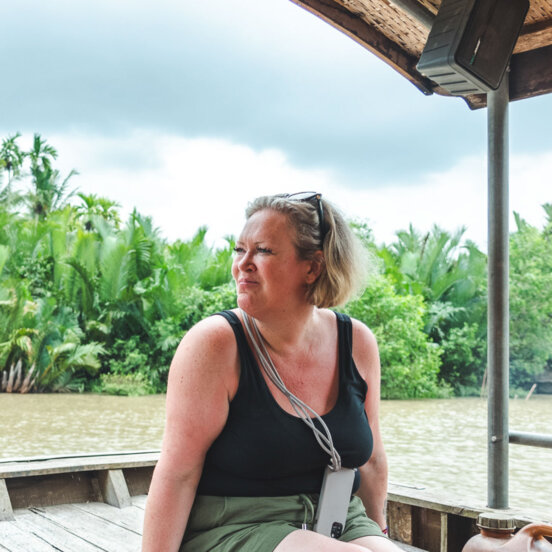Comuna 13 was once Medellín’s most dangerous district. Until these women turned it around…

I grew up in Comuna 13, a hillside neighborhood in Medellín, Colombia. At the height of Pablo Escobar’s reign in the 1980s, it was considered one of the most dangerous places, not just in Latin America, but the entire world. The area was ruled by drug traffickers who were engaged in daily conflicts with the army, police and various guerrilla groups.
Neighborhood women like me were caught up in the crossfire. Many of us had husbands or partners who carried guns. We were also trapped within a deeply patriarchal society where a woman’s place was in the home. It was normal to have huge families and our job was to care for the kids. Only the men went out for work and they could not accept women earning their own money.

It’s a model that’s now used across Colombia, not just in Medellín
I wanted to change that by driving social development and building resilience for a new generation of women. Of course, this wasn’t an easy mission. The pace of change was slow and, even now, progress happens on a step-by-step basis – we still have many barriers to overcome. The kind of challenges we face, such as gender inequality, mental health issues and domestic violence, aren’t solved overnight.
Yet what we have achieved with Berracas de la 13, the community network started by me and a small group of women in my comuna, has been huge. It’s a model that’s now used across Colombia, not just in Medellín.

I never dreamed it would be possible to get a university education
How did I get my start? As part of the government’s Democratic Security Policy – where they invested heavily in water, electricity, education and health services in our neighborhood, along with infrastructure such as our famous escalators – I was one of a handful of people to be given a scholarship to university. I went on to study community management at Servicio Nacional de Aprendizaje (SENA).
We, the people of Comuna 13, never dreamed of a life where it would be possible to get a college education, so that was a game-changing moment.

Many of the men from our families were dead or in jail
Soon after, I founded Berracas de la 13, to empower young people, and women like me, whose lives had been blighted by violence. I was one of the many people to have lost their husbands in the drug wars and the project really began as a matter of survival.
After all the destruction we’d faced, many of the men from our families were dead or in jail. Our only chance, as women and mothers, was to get organized, become leaders and find work to support our families.

Our work also involves bringing about political change
Berracas de la 13 runs workshops on everything from entrepreneurship to mental health and handicrafts. We are a women-led organization, but as far as gender equality is concerned, the kind of societal change we are campaigning for involves both men and women. It’s about instigating a mindset shift through training and debate.
Our work also involves bringing about political change, for example on the issue of femicide. In the old days, if a man killed a woman in Colombia, he might face one year in jail. We’ve lobbied hard to introduce heavy, 18-year-plus sentences on gender-based deaths, which is all the more important given the surge in domestic violence we’ve seen as a result of the pandemic. All this work is driven by a network of fundraising and volunteers.

We liaised with local gang leaders to allow for food to enter
Our impact at Berracas de la 13 is also very much to do with providing local employment opportunities. Back in the 1990s, Comuna 13 had a huge stigma attached to it: even local people from Medellín were afraid to travel here because of its dangerous reputation.
So, we liaised with local gang leaders to allow food vendors from outside the neighborhood to enter and guarantee their safety for two or three hours a day. We gradually negotiated to increase that time, which was a big challenge. Eventually, it led to a wave of tourism opportunities, both with local and international visitors, to help support the next generation.

Over the years, the Berraca restaurant has expanded
Nowadays, Comuna 13 is home to 280 local guides and 243 families who create souvenirs or sell hand-crafted products. With the help of non-governmental organization Planeterra, we have also set up a small restaurant, which started in one local family home and has since moved to another. It seemed like a good opportunity. We were beginning to get lots of tourists in the area but they struggled to find good places to eat.
Over the years, the Berraca restaurant has expanded to provide delicious, home-cooked Colombian food to around 2,000 travelers a week. It employs 18 women, with hundreds more locals benefiting from the additional revenue and interest in the area that the restaurant brings.

It’s taken thousands of strong female leaders to get to this place
Once upon a time, the people of Comuna 13 knew only violence and guns. We had no aspirations. Now, the community has transformed. It’s taken thousands of strong female leaders to get to this place. Our hope is to create gender equality and resources for everyone to thrive in Colombia – not just women from a certain social class.
Thanks to the work of Berracas de la 13, which is respected all over the country, the women of Comuna 13 now have an entrepreneurial mindset, we know how to live with dignity, and – thanks to the legacy we’ve built – no girl will be left behind.
You can visit Berracas de la 13 on Flash Pack’s Colombia adventure. Find your pack today.
Got a story or adventure that could inspire a solo traveler like you? Tag @flashpack on social or email [email protected] to be featured.
Images: courtesy of Berracas de la 13, Flash Pack & Unsplash










